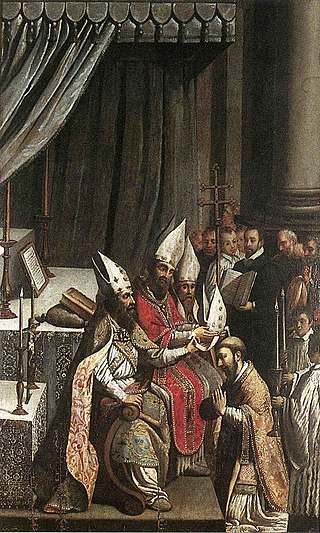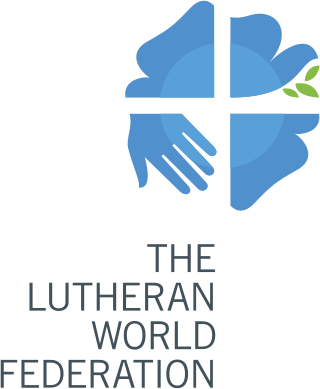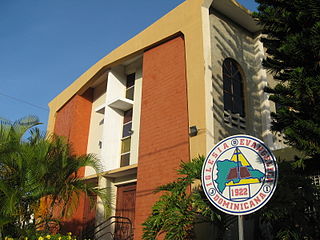Related Research Articles

Apostolic succession is the method whereby the ministry of the Christian Church is considered by some Christian denominations to be derived from the apostles by a continuous succession, which has usually been associated with a claim that the succession is through a series of bishops. Those of the Anglican, Church of the East, Eastern Orthodox, Hussite, Moravian, Old Catholic, Oriental Orthodox, Catholic and Scandinavian Lutheran traditions maintain that "a bishop cannot have regular or valid orders unless he has been consecrated in this apostolic succession". These traditions do not always consider the episcopal consecrations of all of the other traditions as valid.
Full communion is a communion or relationship of full agreement among different Christian denominations or Christian individuals that share certain essential principles of Christian theology. Views vary among denominations on exactly what constitutes full communion, but typically when two or more denominations are in full communion it enables services and celebrations, such as the Eucharist, to be shared among congregants or clergy of any of them with the full approval of each.

Ecumenism – also called interdenominationalism, transdenominationalism, or ecumenicalism – is the concept and principle that Christians who belong to different Christian denominations should work together to develop closer relationships among their churches and promote Christian unity. The adjective ecumenical is thus applied to any interdenominational initiative that encourages greater cooperation and union among Christian denominations and churches.

The Lutheran World Federation is a global communion of national and regional Lutheran denominations headquartered in the Ecumenical Centre in Geneva, Switzerland. The federation was founded in the Swedish city of Lund in the aftermath of the Second World War in 1947 to coordinate the activities of the many differing Lutheran churches. Since 1984, the member churches are in pulpit and altar fellowship, with common doctrine as the basis of membership and mission activity.

A united church, also called a uniting church, is a denomination formed from the merger or other form of church union of two or more different Protestant Christian denominations, a number of which come from separate and distinct denominational orientations or traditions. Multi-denominationalism, or a multi-denominational church or organization, is a congregation or organization that is affiliated with two or more Christian denominations, whether they be part of the same tradition or from separate and distinct traditions.

Munib Younan is a Palestinian Bishop Emeritus of the Evangelical Lutheran Church in Jordan and the Holy Land (ELCJHL).

The term Evangelical Catholic is used in Lutheranism, alongside the terms Augsburg Catholic or Augustana Catholic, with those calling themselves Evangelical Catholic Lutherans or Lutherans of Evangelical Catholic churchmanship stressing the catholicity of historic Lutheranism in liturgy, beliefs, practices, and doctrines. Evangelical Catholics teach that Lutheranism at its core "is deeply and fundamentally catholic". The majority of Evangelical Catholic Lutheran clergy and parishes are members of mainstream Lutheran denominations.

The Evangelical Church of the Dominican Republic is one of the largest Protestant denominations in the Dominican Republic with approximately 10,000 members in 55 congregations.
The Methodist Evangelical Church in Italy, known also as Italian Methodist Church, is a Protestant church in the Methodist tradition active in Italy that was independent until it united with the historical Waldensian Evangelical Church to form the Union of Methodist and Waldensian Churches. As such, it was part of the World Methodist Council.

Finland is a predominantly Christian nation where 65.2% of the Finnish population of 5.6 million are members of the Evangelical Lutheran Church of Finland (Protestant), 32.0% are unaffiliated, 1.1% are Orthodox Christians, 0.9% are other Christians and 0.8% follow other religions like Islam, Hinduism, Buddhism, Judaism, folk religion etc. These statistics do not include, for example, asylum seekers who have not been granted a permanent residence permit.
The Communion of Protestant Churches in Europe is a fellowship of over 100 Protestant churches which have signed the Leuenberg Agreement. Together they strive for realizing church communion, especially by cooperation in witness and service to the world. Prior to 2003 the CPCE was known as the "Leuenberg Church Fellowship".

The Evangelical Lutheran Church in Namibia (ELCIN) is a Lutheran denomination based in Namibia. It has a total membership of over 853,522 in 2023, mainly in Northern Namibia. Formerly known as the Evangelical Lutheran Ovambo-Kavango Church (ELOC), it played a significant role in opposition to Apartheid in Namibia and was part of the Namibian independence struggle.

The Council of Churches in Namibia (CCN) is an ecumenical organisation in Namibia. Its member churches together represent 1.5 million people, 90% of the population of Namibia. It is a member of the Fellowship of Christian Councils in Southern Africa.

The Evangelical Church of the River Plate is a United, Protestant denomination with congregations in Argentina, Paraguay, and Uruguay. It is named after the Río de la Plata Basin, where the majority of its congregations are located. The IERP was affiliated with the Evangelical Church in Germany from 1934–1965, when it became independent. The church ordains women as ministers and supported civil unions and same-sex marriage. It has approximately 27,500 members.
The Caribbean Conference of Churches is a regional ecumenical body with 33 member churches in 34 territories across the Dutch, English, French and Spanish speaking territories of the Caribbean. It was founded in 1973.
The Christian Council of Sweden is an ecumenical Christian organization in Sweden, established on 15 December 1992.
The Swedish Baptist Union of Finland is a registered Baptist union based in Vaasa, Finland that was founded in 1980. It is an umbrella organization for the Baptist churches of the Swedish-speaking minority in Finland. The union consists of 13 congregations and approximately 1000 members.

Baptists in Finland have existed since the middle of the 19th century. They are part of the Baptist branch of Protestant Christianity and belong to three different Finnish church associations. Swedish-speaking Finns formed the Swedish Baptist Union of Finland, while Finnish-speaking Baptists are united in the Finnish Baptist Church ; two Finnish congregations are a part of the Seventh Day Baptists. In addition, a few independent Baptist churches exist, including Grace Baptist Church in Tampere. The congregation was formerly known as Perinteinen Baptistiseurakunta in Finnish and International Baptist Church in English. Agape International Baptist Church in Pedersöre is also among the independent Baptist churches.
References
- ↑ "Finnish Ecumenical Council". World Council of Churhces. Retrieved 14 July 2023.
- ↑ "Finnish Ecumenical Council member list" . Retrieved 2023-07-14.